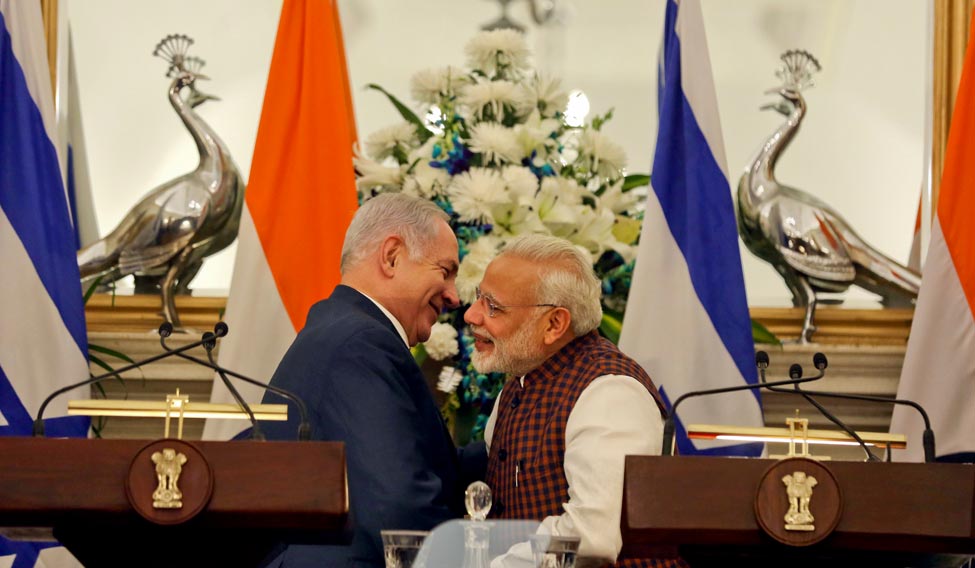The rightists in India are toasting to a new India-Israel alliance (the ultra-rightists read it as Hindu-Hebrew), and the leftists are crying over the end of Nehruvian non-alignment and of solidarity with the Palestinian underdogs. The fact is: Neither side is getting the true picture.
The rightists made much of Narendra Modi's historic visit to Israel, and his decision not to pay even a courtesy visit to Ramollah. It was a break from the past when every Indian dignitary who made an official visit to Israel had made at least a flying visit to the Palestinian capital.
But look at the facts. Indeed, Modi did not attempt to 'balance' his July visit to Israel with a hop-over to Palestine. But then, a month and half earlier, he had warmly received Palestine President Mahmoud Abbas in Delhi, and explained to him the intent and content of his forthcoming Israel visit. A few months earlier, he had also sent Foreign Minister Sushma Swaraj to call on Abbas and explain to him the changing dynamics of India's relation with the Arab world.
And now, having hosted Israel Prime Minister Benjamin Netanyahu on Indian soil, Modi is planning a visit—a balancing one, if you please—to Palestine within three weeks. Only a week ago, had India voted in the UN against Israel and the US on recognising Jerusalem as Israel's capital. And even as Netanyahu was still on the Indian soil, the Indian foreign office confirmed the date (February 10) of Modi's planned visit to Palestine.
Thus, if one side can hail Modi's July 2017 visit as the first ever made by an Indian prime minister to Israel, the other side can hail his February 10 visit to Palestine, too, as the first ever by an Indian prime minister.
Interestingly, one of the subjects that Modi talked to Netanyahu during the latter's visit to India was Palestine. Netanyahu briefed Modi in detail about what he was doing to seek peace with Palestine, knowing well that Modi would be discussing the same issues with Abbas.
The fact is that, as THE WEEK had reported last June, Israel's Palestine policy is changing. Today, Netanyahu is facing flak from the ultra-rightists in Israel for having gone soft towards Palestine. As Col. Eran Lerman of the Begin-Sadat Centre wrote recently, the Israeli defence forces are no longer adopting a harsh line, and this is bearing fruits. “Interactions between Israel and the Palestinian Authority at the ministerial level have offered proof of the value of current Israeli strategy towards the Palestinian population. First came the positive meeting between PA Prime Minister Rami Hamdallah and Israeli Finance Minister Moshe Kahlon, during which the former offered uncharacteristic praise of Israel’s measured response to the wave of violence that began in October 2015. Then came the July 10 inauguration in Jenin of the power plant project, jointly launched by Hamdallah and Energy Minister Yuval Steinitz, which indicates once again the utility of Israel’s gas exports as a tool of regional policy.”
The fact is that Israel is now seeking to reach out to the Sunni Arab world, and the Arabs, too, have been reciprocating. There have been instances of India having facilitated secret meetings between Arab and Israeli military leaders. Both Israel and the Sunni Arabs are apprehensive of the rise of Shia Iran, and India is one country that still has excellent relations with Iran.
India has made it clear to the west, to Israel and to the Arab world that it cannot dump its ties with Iran which, through its Chabahar port, provides India's only access to Afghanistan. Iran had also been hosting Indian ships and even sending its own warships to exercise with them close to Pakistani waters. In fact, only two days before Netanyahu arrived in India, India's Transport and Highways minister Nitin Gadkari was overseeing a $600 million pact with Iran’s Roads and Urban Development minister Abbas Ahmad Akhoundi. India can ill-afford to give up all this, and the Israelis, past masters at pragmatic politics, know this very well.
While most political commentators—both rightist and leftist—continue to look at West Asia through the prism of old cold war rivalries, the good thing is that Indian foreign policy establishment has learnt the value of pragmatism in foreign policy. India needs both Israel and the Arab world, and is learning to manage both. As the Netanyahu visit itself demonstrated, India needs Israel's expertise and technologies in defence, agriculture, water management while Israel needs India's industrial potential, raw materials, and the heft of its rising strategic military profile especially in the Indian Ocean. Similarly, India will continue to seek the goodwill of the Arab world for their oil, their huge labour market, and their political heft to manage the Islamic central Asia and Pakistan, while the Arabs will need India as a reliable investment destination, a guardian of the eastern seas through which their oil tankers pass, and a source of inexpensive skills.
 Demonstrators hold Palestinian flags during clashes with Israeli troops, near the border with Israel in the southern Gaza Strip | Reuters
Demonstrators hold Palestinian flags during clashes with Israeli troops, near the border with Israel in the southern Gaza Strip | Reuters
Indeed, the relationship is growing, and growing fast. Both sides had for long wanted a strategic partnership, but in July they couldn't agree on what it meant, and what it would contain. While Israel would not call a relationship “strategic” unless it had certain security perceptions, the Indian side was willing to have a “strategic partnership” over even purely development-related matters. Finally, both had agreed to a strategic partnership on civil matters, which sounded like an oxymoron: “Strategic partnership in water and agriculture!” This time, they left it vague in the joint statement—they merely stated they “have consolidated the foundation for their strategic partnership”.
The joint statement also noted that “both sides also agreed to deepen cooperation in innovation, business and trade, space, homeland security and cyber, higher education and research, science and technology, tourism and culture”. The main focus, however, was on agriculture. Israel is already running 28 centres for imparting new farming technologies and seven more have been opened since Modi's July visit.
In the world of technology development, Israel looks at itself as a laboratory. It can develop technologies on home soil, but it needs shop floors to work those technologies and produce goods. And India, in their reckoning, can provide thousands of them. The joint statement indicated that “all formalities” for the launch of an India-Israel Industrial R&D and Technological Innovation Fund (I4F), announced during Modi’s visit to Israel, have been completed.
One area where Israel is most constrained—geographically and technologically—and India is light years ahead, is space technology. Space engineers across the world like to launch their satellites eastward because the earth's eastward spin gives the satellite an additional thrust. But since Israel has only enemies to its east, and its only sea coast is to the west, the Israelis just can't launch its satellites eastward. They envy India's ideal launch pads located on the east coast, and love to get their satellites launched by India. Thus, in 2008, Israel got India to launch a radar imaging satellite TecSAR, and the next year they gifted India a radar imaging satellite RISAT-2, with a secret one-metre resolution camera used for surveillance. Since then the cooperation has been flowering, and space scientists of the two countries had met in November to discuss the implementation of the two MoU’s and one Plan of Cooperation signed between the two space agencies.
One area that both sides feel that the progress has been tardy is trade and investment. The Israelis, who are loaded with money and skilled in industrial technology, are still reluctant to invest in India because of what they call India's lax intellectual property laws. Modi and Netanyahu have now agreed that this needs to be further talked over and are arranging official-level meetings in February.
Israeli is already India's largest military supplier in terms of technology, but is lagging in actual hardware. Israeli companies want to set up shop in India and start manufacturing under Make in India, but India's insistence on transfer of technology makes them wary. The two prime ministers have asked their defence ministers to talk this over with each other and with their industries, both the public and private sectors.
The real strategic cooperation in security matters is going to be in terror and cyberspace. The Joint Working Groups on Homeland and Public Security will meet in February 2018, and chalk out further areas of cooperation.
India's foreign policy mandarins, always good at semantic spin-doctoring, say India is dehyphenating the bilateral relationships. India's Arab policy, they say, no longer needs to be hyphenated to its policy towards Israel and vice-versa. In simpler terms, whenever they say “Arab”, there is no need to put a hyphen and add “Israel”. The relationship with one will now be independent of the relationship with the other.
That looks a little far-fetched. The fact is India is still hyphenating the relationships. The only change is that the hyphen is getting a little longer, and perhaps becoming a dash.






